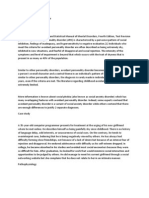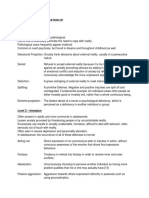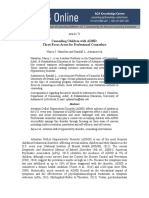How To Spot A Narcissist
How To Spot A Narcissist
Uploaded by
jovanab017Copyright:
Available Formats
How To Spot A Narcissist
How To Spot A Narcissist
Uploaded by
jovanab017Original Title
Copyright
Available Formats
Share this document
Did you find this document useful?
Is this content inappropriate?
Copyright:
Available Formats
How To Spot A Narcissist
How To Spot A Narcissist
Uploaded by
jovanab017Copyright:
Available Formats
Spotting a narcissist can be challenging, as they often possess charming and charismatic
qualities. However, there are certain signs and behaviors that may indicate narcissistic
tendencies. Keep in mind that not everyone who exhibits these traits is necessarily a
narcissist, as these behaviors can also be present in other personality disorders or
individuals going through difficult times. Here are some common signs of narcissism:
1. Exaggerated Sense of Self-Importance:
Narcissists often exaggerate their achievements, talents, or importance.
They may constantly seek admiration and validation from others.
2. Preoccupation with Fantasies of Unlimited Success, Power, Brilliance, or
Beauty:
Narcissists may daydream about their limitless success, power, intelligence,
or attractiveness. They might believe they are special and unique.
3. Belief in their Superiority:
Narcissists have a deep-seated belief in their own superiority and may look
down on others. They may be condescending or dismissive of those they
perceive as inferior.
4. Lack of Empathy:
Difficulty or inability to empathize with the feelings and needs of others is
a common trait. Narcissists may seem indifferent to the concerns of others
and may not recognize or acknowledge the impact of their behavior on
those around them.
5. Manipulative Behavior:
Narcissists often manipulate others to achieve their own goals. They may
use charm, guilt, or intimidation to get what they want.
6. Difficulty Maintaining Healthy Relationships:
Relationships with narcissists can be challenging, as they often struggle
with genuine emotional intimacy. They may exploit others for personal
gain and discard them when they no longer serve their needs.
7. Constant Need for Admiration:
A narcissist craves constant admiration and attention. They seek validation
from others and may become frustrated or angry if they feel overlooked.
8. Sense of Entitlement:
Narcissists often believe they are entitled to special treatment and
privileges. They may expect others to comply with their desires without
question.
9. Envy and Belief Others Are Envious of Them:
Narcissists may envy others and believe that others are envious of them.
This can lead to competitive and hostile behaviors.
10. Fragile Self-Esteem:
Paradoxically, beneath the exterior of superiority, some narcissists have
fragile self-esteem and can be sensitive to criticism.
It's important to note that everyone may exhibit some narcissistic traits from time to
time, but when these traits are persistent and severe, it may indicate a more significant
issue. If you suspect someone you know might be a narcissist or if you're dealing with
the impact of narcissistic behavior, consider seeking support from mental health
professionals who can provide guidance and assistance.
You might also like
- On Whatever Is in Our Tribal Environment. This Might Have Worked in A Small100% (1)On Whatever Is in Our Tribal Environment. This Might Have Worked in A Small3 pages
- 1 Understanding Different Communication Styles100% (2)1 Understanding Different Communication Styles8 pages
- Differential Diagnosis: Narcissistic Personality DisorderNo ratings yetDifferential Diagnosis: Narcissistic Personality Disorder4 pages
- International Personality Disorder Examiniation IPDENo ratings yetInternational Personality Disorder Examiniation IPDE5 pages
- What is Ketamine Therapy_ - Homewood Health CentreNo ratings yetWhat is Ketamine Therapy_ - Homewood Health Centre8 pages
- Difference Between Unhealthy and Healthy CommunicationNo ratings yetDifference Between Unhealthy and Healthy Communication3 pages
- Conflict: Healthy and Unhealthy Ways of Managing and Resolving CNo ratings yetConflict: Healthy and Unhealthy Ways of Managing and Resolving C4 pages
- Year 11 Atar Health Studies: Skills & Processes - Self-Management SkillsNo ratings yetYear 11 Atar Health Studies: Skills & Processes - Self-Management Skills28 pages
- Exercise 1: How Would You Treat A Friend?: Please Take Out A Sheet of Paper and Answer The Following QuestionsNo ratings yetExercise 1: How Would You Treat A Friend?: Please Take Out A Sheet of Paper and Answer The Following Questions2 pages
- Why Do Narcissists Always Play The Victim - Inner Toxic Relief - Reader View100% (1)Why Do Narcissists Always Play The Victim - Inner Toxic Relief - Reader View17 pages
- AwakenedIntimacy AwakeningThroughIntimacyNo ratings yetAwakenedIntimacy AwakeningThroughIntimacy14 pages
- Aillant S Categorization of Defense Mechanisms Level 1 - PathologicalNo ratings yetAillant S Categorization of Defense Mechanisms Level 1 - Pathological4 pages
- Field Version of UMF Unit-Wide Lesson Plan TemplateNo ratings yetField Version of UMF Unit-Wide Lesson Plan Template7 pages
- Not Normal: Unconventional Marriage Tips for Mature Couples Starting AgainFrom EverandNot Normal: Unconventional Marriage Tips for Mature Couples Starting AgainNo ratings yet
- How I Healed from Narcissistic Abuse by Understanding Universal Laws: 1, #1From EverandHow I Healed from Narcissistic Abuse by Understanding Universal Laws: 1, #15/5 (1)
- Paper 1 PYQs Compilation Sociology 15 JuneNo ratings yetPaper 1 PYQs Compilation Sociology 15 June18 pages
- (2021) Torabi Et Al., Effect of Sensory Experience On Customer Word-Of-Mouth Intention, Considering The Roles of CE, CS, CLNo ratings yet(2021) Torabi Et Al., Effect of Sensory Experience On Customer Word-Of-Mouth Intention, Considering The Roles of CE, CS, CL18 pages
- Stresses and Challenges For New Graduates in HospitalsNo ratings yetStresses and Challenges For New Graduates in Hospitals6 pages
- The Impact of Psychological Capital On Teaching Effectiveness in The Bafut Sub DivisionNo ratings yetThe Impact of Psychological Capital On Teaching Effectiveness in The Bafut Sub Division21 pages
- Course Guide: Pangasinan State University Asingan, Pangasinan100% (1)Course Guide: Pangasinan State University Asingan, Pangasinan2 pages
- Persuasion and Communication in Sport, Exercise, and Physical ActivityNo ratings yetPersuasion and Communication in Sport, Exercise, and Physical Activity2 pages
- Place Type or Place Function: What Matters For Place Attachment?No ratings yetPlace Type or Place Function: What Matters For Place Attachment?15 pages
- 7-Approaches/Methods in Counseling Solution-Focused Brief Counseling (SFBC) 3. Miracle QuestionNo ratings yet7-Approaches/Methods in Counseling Solution-Focused Brief Counseling (SFBC) 3. Miracle Question11 pages
- Understanding Theories and Concepts of Modern Psychology100% (1)Understanding Theories and Concepts of Modern Psychology4 pages
- Organizational Change Project: Company ZZZNo ratings yetOrganizational Change Project: Company ZZZ31 pages
- Disc & Motivators Report For: Ngoc DangNo ratings yetDisc & Motivators Report For: Ngoc Dang10 pages

























































































